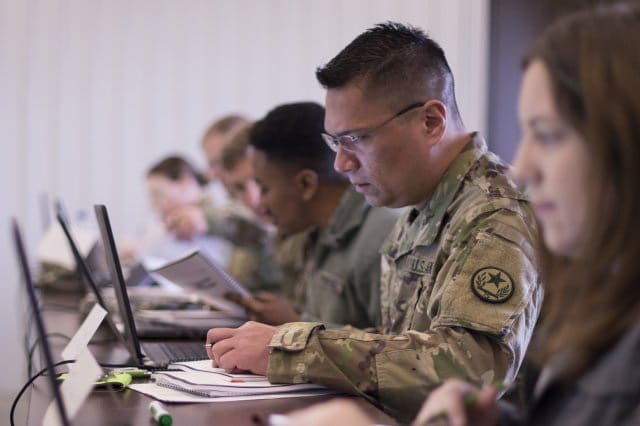WASHINGTON — The National Guard is ready to mobilize its cyberdefenses in case of a potentially devastating domestic attack.
“When I first joined the National Guard, cyber was not part of our vocabulary, but certainly now it is one of our daily battlegrounds,” said Air Force Gen. Joseph L. Lengyel. “Our adversaries and non-state actors use cyber activity to target personnel, commercial and government infrastructure and the effects can be devastating.”

Lengyel, chief of the National Guard Bureau, talked about the Guard’s cybermissions and capabilities during a media roundtable on Nov. 5 at the Pentagon.
Lengyel said cyberattacks have occurred at both the federal and state levels.
Earlier this year, a number of school districts and agencies in Louisiana and Texas suffered ransomware attacks. Ransomware is a type of malicious software designed to block access to a computer system until a ransom is paid.
With the help of the Guard, schools opened on time and agencies were able to get back to work, Lengyel said.

“[Ransomware] is obviously a new and emerging kind of enterprise. We are able to access superb civilians and skill sets, and they can bring capabilities that the military sometimes does not have,” Lengyel noted.
In Texas, 22 counties were attacked with ransomware during June, disrupting local service, said Army Maj. Gen. Tracy R. Norris of the Texas National Guard.
Norris said Texas’ department of emergency management called the Guard, and officials assessed the attacks with a team of Guard soldiers and airmen.
“It was a joint team that went out to assess [the damage],” she said. “From there, they picked different places to go [in] the counties for the recovery process. We thought it was bad in the beginning, and it couldn’t have been much worse.”
“We already had a team in place and sent them out to assess, and we then aligned the team [based on] what the assessment showed,” Norris said.

Lengyel said the Illinois Guard is forming a cyber task force to assist the state of Illinois, as the need arises.
The Illinois task force will involve Guard soldiers and airmen performing cyber, information technology and other military functions.
Indiana recently started a cyber battalion, and personnel will be trained to military standards for use in a domestic response capacity if they need to be, Lengyel said.
“So, this will be part of the cyber mission force that will be part of the Army mission that, if needed, can be federalized and mobilized to do cyber activity for the U.S. Army or the U.S. Cyber Command,” Lengyel said. “And when they’re not mobilized, we can do our homeland mission.”
Lengyel said many of these Guard members have cyber-related civilian jobs. He said it’s an example of how the varied skill sets of Guard members contribute to national defense.
“They can do things working in national defense they can’t do in their civilian careers,” he said of Guard members.
Other attendees included vice director of domestic operations, National Guard Bureau; National Guard adjutant generals from Washington and Illinois; and the National Guard advisor to the commander of U.S. Cyber Command.
Story by Terri Moon Cronk, Defense.gov
Photos by U.S. Air Force Staff Sgt. Jonathon Alderman, Wyoming Air National Guard and U.S. Army National Guard Staff Sgt. Brendan Stephens, North Carolina National Guard

